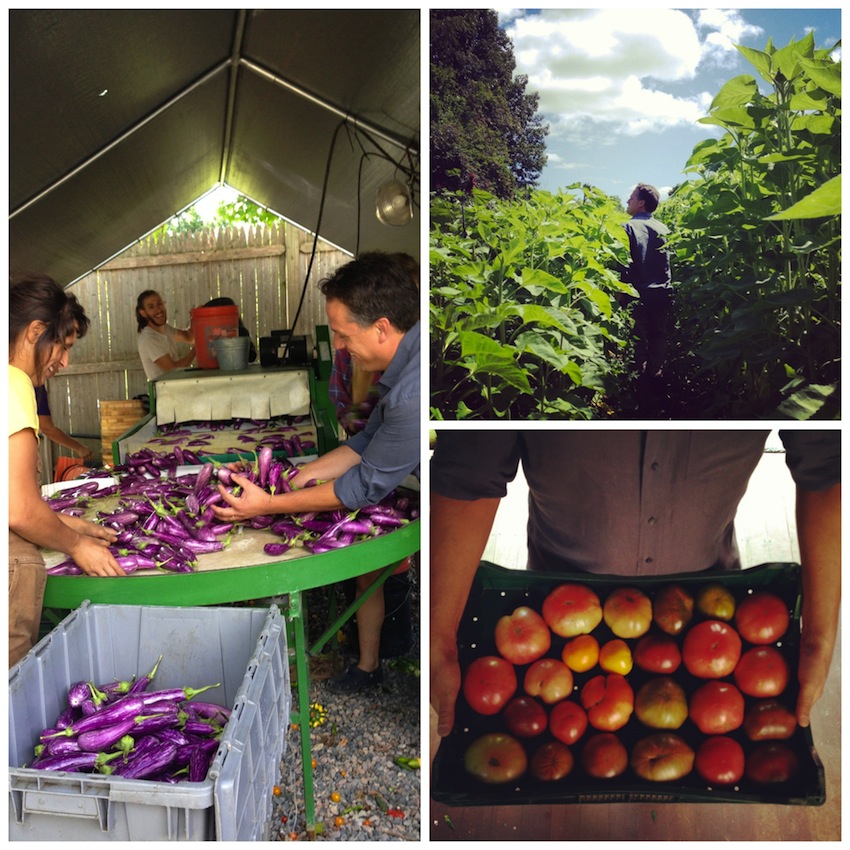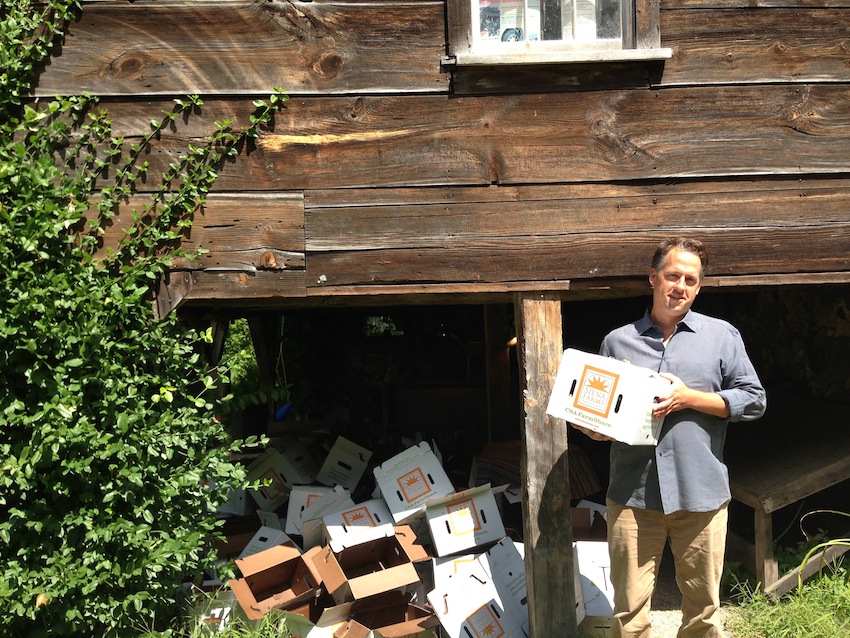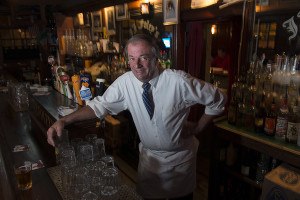Supply Chain: A Visit with Chris Kurth of Siena Farms
Welcome to Supply Chain, where we go behind the plate to get a feel for the day-to-day of Boston’s most relied-upon restaurant purveyors.
Chris Kurth dives into a narrow lane of sunflowers, most of the blooms hovering just above his head, surrounded on all sides by slightly sticky and soft leaves. It’s a setting that evokes the giddy adventurousness of corn mazes in the fall, of getting lost in a world that isn’t quite your own. As he darts in between the rows, inspecting the flowers as he goes, I quicken my pace and keep my eye trained on the empty spaces in between the stalks.
When I snap a few shots as we roam the property, it soon becomes very clear he is a rare find: a farmer who doesn’t mind coming out from behind the curtain. “Well,” he tells me later, shrugging good-naturedly as we rumble down the road in a dusty truck, “You get pretty used to it, with Ana being the talent she is.”
Kurth—as the owner of Sudbury’s Siena Farms, and one half of the ultimate farm-to-table celebrity couple with Oleana’s Ana Sortun—has found that providing the ingredients to a few noteworthy culinary meccas in this city means occasionally being thrust into the limelight. Despite that, the couple has carved out a quiet life here, a 45-minute drive from all the attention.
Kurth grew up on this land, and his parents and grandmother (“She’s 92 now,” he says with a grin, “and she always has a lot of advice about running things around here”) still live on the property. He and Sortun, along with their daughter Siena, live just down the street in a house set back from the main road, framed on all sides by lush trees. His parents were never farmers, he explains, just enthusiastic and active gardeners who owned a few fields surrounding the house. When Kurth graduated from college, after working on farms during summers and completing an apprenticeship in New York, these fields served as his springboard.
“Once I got a taste of the work and the product of the work, I knew pretty early on that it was what I wanted to keep doing,” he says. “I thought I was ready to start my own farm, even though at that point I knew very little about how to run a business.”
For four years, he ran a small, 10-acre CSA farm, but was unable to make it work (even though as legend has it, Sortun first fell for him when he showed up at Oleana’s back door to hock spinach one day) so he packed up and went to work at The Farm School in Athol as an instructor. When Siena was born, the decision was made to give the farm in Sudbury another shot. The timing was right: now in its eighth season, the farm has been steadily increasing its reach to the 60 acres it occupies today, and is continuing to expand.
Kurth and his team grow over 100 different varieties of organic vegetables, which can be found at the Copley Square Farmer’s Market twice a week, at their two-year old South End store year round, and tucked into 750 CSA boxes that are shipped throughout the city. They are also most notably the produce engine that powers Oleana, Sofra, the upcoming Sarma, and a few Barbara Lynch Gruppo outposts.
“We used to do a lot more deliveries to restaurants, but with the expansion of the CSA and the store getting busier, we wanted to scale up those parts of our operation and draw back a little bit from the deliveries,” he explains. “This summer we’ve started doing deliveries in the South End and Back Bay by foot from the store, which is a fun, emerging relationship to have with local restaurants.”
Lynch has been one of their biggest supporters over the years, he says, and it was through her invitation to sublease her Waltham Street space (which was formerly Lynch’s Plum Produce) that the store became a reality. “Now, her chefs walk into Siena Farms South End multiple times a day for veggies,” Kurth says.
Chickens (resplendently attractive ones, I might add, as an important side-note) cluck in the background—the farm is testing the waters of egg production, he tells me—and every once in a while we stop talking while a tractor lumbers by, seeming strangely out of place on the quietly rustic property.
When they do make deliveries, it’s at the discretion and needs of the kitchen. They make everything available, and menus are often developed around it. Sofra chef Geoff Lukas attests to the benefits of being so closely entwined with a consistent and high-quality resource.
“Having such an intimate relationship makes my job easier on several levels,” he says. “It gives me a lot of freedom to explore the various expressions of the different ingredients.”
“Eggplant is a perfect example,” he continues. “Nightshades deteriorate very quickly in refrigeration, so once we have access to Siena’s eggplant, it’s like a revelation. When produce is grown with transportation in mind, a lot of the delicacy is lost. It’s refreshing to have the opportunity to work with product that is more nuanced in flavor and texture.”
Lukas, whose background is in mathematical physics, spent his first eight years in the industry in relatively low-end establishments. As a result, the fine-print technical details of working so closely with the farm are all the more noticeable.
“I’ve grown to appreciate the difference between menu concepts designed for revenue, and those that are written with the ingredients and the customer experience in mind,” he notes. “It’s challenging to fine tune our execution in a way that reflects the very subtle changes in produce as it grows…it makes you more conscious of working with a living thing, and engenders a lot of respect.”
That respect is a tangible force among the farm’s staff, and the produce coming out of this joint couldn’t be any more sublime if Kurth sang the crops to sleep and tucked them in every night. This summer is a particularly exciting time for the farm family, thanks to the long-awaited purchase of a particularly productive and beloved 26-acre parcel of land down the road.
“Access to the lease on that land was the real spark that enabled us to restart the farm eight years ago, and to grow the business,” he explains. Three years ago, the owners began thinking about selling, and just one month ago, they were finally able to close on the deal. It’s a major coup, and an important step towards cementing the farm’s legacy.
(The land is so special, in fact, that it merits a celebratory “FarmRaiser” dinner. If you dig the black tie and mud boots look, this is the rager for you: Sortun and Lynch will be doing what they do best, and Drink’s John Gertsen will be there to get you hammered. You and 99 of your closest buds, at $1000 a pop, party the night away in a field, under the stars.)
“Aside from the immediate gratification of harvesting a bumper crop of something that you’ve invested in, the slow and steady growth of the farm as a whole from year to year is a very satisfying process,” Kurth says. “It feels like we’re participating in something a little larger than ourselves.”




